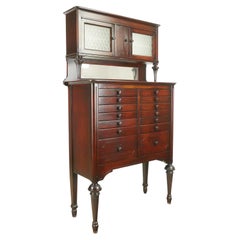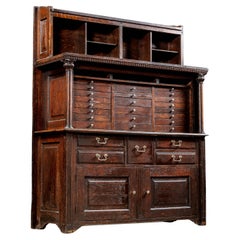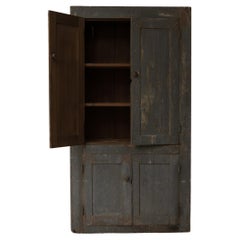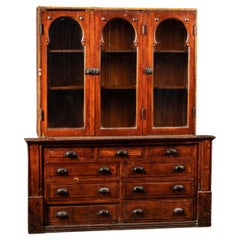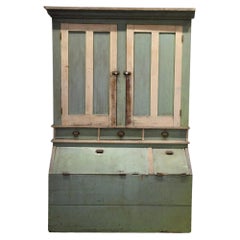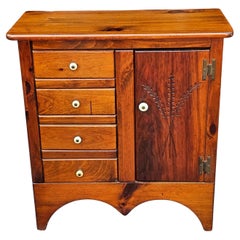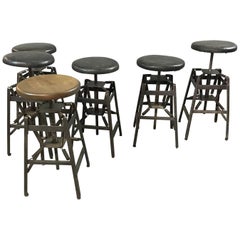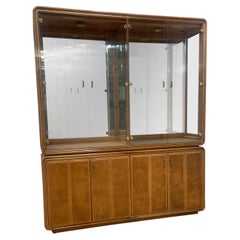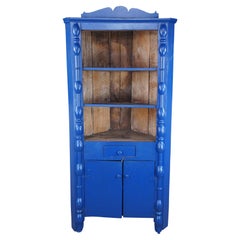Early American Cabinet
Early 20th Century American Cabinets
Glass, Milk Glass, Mirror, Mahogany
Early 20th Century American Late Victorian Cabinets
Oak
Antique 19th Century North American Cabinets
Softwood, Paint
Antique 1890s American Late Victorian Cabinets
Wood
Antique Early 19th Century American Industrial Cabinets
Metal
Mid-20th Century American American Colonial Cabinets
Pine
Early 20th Century North American Industrial Stools
Steel
Early 20th Century American Art Deco Cabinets
Brass
Early 20th Century American Classical Corner Cupboards
Glass, Hardwood, Paint
Antique 19th Century American American Colonial Corner Cupboards
Pine
Antique Early 19th Century American American Classical Corner Cupboards
Wood
Early 20th Century American Cabinets
Marble
Late 20th Century American American Colonial Cabinets
Upholstery, Cherry, Fruitwood
Antique 19th Century American American Colonial Cupboards
Pine
Antique Early 19th Century American Rustic Apothecary Cabinets
Pine
Antique Early 19th Century American American Classical Corner Cupboards
Blown Glass, Maple
Early 20th Century American Edwardian Cabinets
Glass, Wood
Late 20th Century American American Colonial Corner Cupboards
Hardwood, Paint
Antique Early 19th Century American Colonial Bookcases
Wood, Paint
Early 20th Century American American Craftsman Cabinets
Pine
Early 20th Century American Georgian Bookcases
Glass, Boxwood, Mahogany
Early 20th Century North American Industrial Apothecary Cabinets
Oak
Early 20th Century American American Craftsman Cabinets
Brass
Antique Early 19th Century American American Empire Cabinets
Marble
Early 20th Century North American Rustic Cupboards
Pine
Antique 1840s American American Empire Sideboards
Brass
Antique Early 19th Century American American Empire Cabinets
Rosewood
Antique Early 19th Century American Federal Vitrines
Mahogany
Antique Early 19th Century American Secretaires
Wood
Early 20th Century American American Colonial Cabinets
Glass, Oak
Antique Early 19th Century American American Empire Cabinets
Carrara Marble
Antique Early 1900s American American Craftsman Cabinets
Sheet Metal, Tôle
Early 20th Century American Industrial Stools
Metal, Steel
Early 20th Century American American Colonial Cabinets
Iron
Early 20th Century North American American Classical Cabinets
Brass
Antique Late 18th Century American Primitive Corner Cupboards
Wood
Early 20th Century North American American Colonial Cupboards
Glass, Wood
Early 20th Century American Rustic Sideboards
Oak
Antique Early 1800s American American Colonial Corner Cupboards
Pine
Antique 19th Century North American Sideboards
Mahogany
Antique Early 18th Century American Commodes and Chests of Drawers
Poplar, Pine
Antique Early 19th Century American Chippendale Dressers
Maple
Early 20th Century Victorian Dressers
Brass
Early 20th Century American American Colonial Blanket Chests
Metal
Antique Early 19th Century American Primitive Shelves
Pine
Early 20th Century American Industrial Apothecary Cabinets
Iron
Early 20th Century Victorian Dressers
Brass
Early 20th Century American Commodes and Chests of Drawers
Pine
Vintage 1970s Mid-Century Modern Shelves
Wood
Antique Mid-19th Century American Colonial Secretaires
Glass, Hardwood
Early 20th Century American American Classical Blanket Chests
Metal
Early 20th Century American American Classical Blanket Chests
Metal
Early 20th Century American American Classical Blanket Chests
Metal
Mid-20th Century North American Mid-Century Modern Cabinets
Walnut
Early 20th Century Colonial Revival Cabinets
Glass, Oak
Antique 19th Century American American Colonial Commodes and Chests of D...
Walnut
Early 20th Century American American Classical Blanket Chests
Metal
Antique 19th Century American Rustic Desks
Pine
- 1
- ...
Early American Cabinet For Sale on 1stDibs
How Much is a Early American Cabinet?
Finding the Right Case Pieces And Storage Cabinets for You
Of all the vintage storage cabinets and antique case pieces that have become popular in modern interiors over the years, dressers, credenzas and cabinets have long been home staples, perfect for routine storage or protection of personal items.
In the mid-19th century, cabinetmakers would mimic styles originating in the Louis XIV, Louis XV and Louis XVI eras for their dressers, bookshelves and other structures, and, later, simpler, streamlined wood designs allowed these “case pieces” or “case goods” — any furnishing that is unupholstered and has some semblance of a storage component — to blend into the background of any interior.
Mid-century modern furniture enthusiasts will cite the tall modular wall units crafted in teak and other sought-after woods of the era by the likes of George Nelson, Poul Cadovius and Finn Juhl. For these highly customizable furnishings, designers of the day delivered an alternative to big, heavy bookcases by considering the use of space — and, in particular, walls — in new and innovative ways. Mid-century modern credenzas, which, long and low, evolved from tables that were built as early as the 14th century in Italy, typically have no legs or very short legs and have grown in popularity as an alluring storage option over time.
Although the name immediately invokes images of clothing, dressers were initially created in Europe for a much different purpose. This furnishing was initially a flat-surfaced, low-profile side table equipped with a few drawers — a common fixture used to dress and prepare meats in English kitchens throughout the Tudor period. The drawers served as perfect utensil storage. It wasn’t until the design made its way to North America that it became enlarged and equipped with enough space to hold clothing and cosmetics. The very history of case pieces is a testament to their versatility and well-earned place in any room.
In the spirit of positioning your case goods center stage, decluttering can now be design-minded.
A contemporary case piece with open shelving and painted wood details can prove functional as a storage unit as easily as it can a room divider. Alternatively, apothecary cabinets are charming case goods similar in size to early dressers or commodes but with uniquely sized shelving and (often numerous) drawers.
Whether you’re seeking a playful sideboard that features colored glass and metal details, an antique Italian hand-carved storage cabinet or a glass-door vitrine to store and show off your collectibles, there are options for you on 1stDibs.
- 1stDibs ExpertNovember 13, 2024To identify early American furniture, you can evaluate your piece on your own or seek the opinion of a certified appraiser or experienced antique dealer. Although many pieces from the Colonial era are unmarked, double-checking your furniture for signatures, stamps and labels is still a good first step. Using trusted online resources, you can research any markings to determine if the maker was active in America during the 16th and early 17th centuries. When identifying unmarked furniture, it's generally necessary to consider the style and details of the piece. Due to its handcrafted origins, early American furniture tends to have visible tool marks and irregularities in its carvings. Early American furnishings tended to be simple in style but often had one or two refined details, such as cabriole legs. Looking at images of authentic early American furniture can be helpful when making an identification. On 1stDibs, find a collection of 18th-century American furniture.
- 1stDibs ExpertSeptember 23, 2024The early American furniture style is often called the Colonial style. During the 17th century, American craftsmen drew inspiration from medieval and Renaissance furniture. By the 18th century, the William and Mary style that had emerged in England began to heavily influence the American Colonial style. Characteristics of Colonial-style furniture include turned legs, ornamental carvings and richly finished cherry, walnut and mahogany wood. On 1stDibs, shop a selection of Colonial-style furniture.
Read More
The Ultimate Guide to Types of Tables for the Home
Whether you’re just moving in or ready to give your home a makeover, our guide will give you pointers on tables that are fitting for every room, nook and hallway.
What Exactly Is a Secretary Desk, and What Is It Used For?
The furniture equivalent of a Swiss Army knife, it's the multifunctional piece you didn't know you needed.
This Shelving System with Oxidized Brass Tubes Is Retro and Futuristic at Once
Italian studio DimoreMilano mustered great ingenuity when crafting these sculptural shelves, which are built without any screws.
28 Cheerful Home Bars, Where Everybody (Literally) Knows Your Name
Simple or sophisticated, equipped with console, cart or custom cabinetry, these stylish bar areas deserve a toast.
Ask an Interior Designer: Work-from-Home Edition
Leaping into a design project, whether it's refreshing the bedroom or redoing the whole house, can be overwhelming. Luckily, we know more than a few interior designers. You asked questions on Instagram, and now they're answering.
Collected and Eclectic, ‘Wunderkammern’ Are Back in a Big Way
Introduced nearly 500 years ago, curiosity cabinets are finding new fans among today's collectors and designers.
Meet the Incredible Woman Transforming Fallen Trees into Sleek Furniture
In the hands of New York Heartwoods cofounder Megan Offner, unwanted local trees become works of design art.
These New York Architects Love a Complicated Project
From Brooklyn townhouses to Maine campgrounds, Trattie Davies and Jonathan Toews relish a challenge, like transforming a former warehouse space into the new 1stdibs Gallery.
